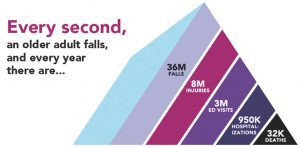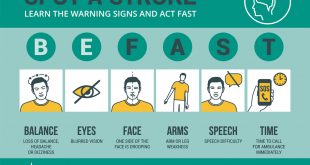By Elizabeth Schwartz, O.D. – Quigley Eye Specialists


Every second, an older adult falls and every year there are 36 million falls among those age 65 and older, according to the Centers for Disease Control and Prevention. One out of five falls cause serious injury such as broken bones or a head injury.
Vision impairment may be to blame in many of these cases. Blurred vision may cause you to not see objects in your path as clearly as you once did, which will increase your chances of falling. In some cases, other eye conditions such as undiagnosed near-sightedness, an out-of-date eyeglass prescription, eye infections, glaucoma or macular degeneration can increase the risk of falling.
That’s why the ophthalmologists at Quigley Eye Specialists recommend that all people, but especially those 65 and older, receive a comprehensive eye exam every year. Changes in your vision can be monitored and treatment can be started as soon as the first signs appear. We also assess your risk of falling and make recommendations on how you can make your home safer.
Here are some tips to help:
. Small throw rugs are a tripping hazard and should be rolled up and put away.
. Clear the clutter. Random items left on the floor make it more difficult to have a clear path for walking.
. Use bright bulbs where they are needed most, but especially at room entrances and the top and bottom of stairs.
. Wear rubber-soled shoes around the house to gain traction.
. Use hand rails in the shower since slippery surfaces make your more prone to falling;
. Review your medications with your doctor. Some medications for arthritis, high blood pressure, heart disease and sleeping can cause dizziness.
Your doctor can recommend alternatives.
. Consider a fall detection device that will alert help should you need it.
. Limit alcohol consumption. Older adults cannot process alcohol as easily as they did when they were younger which can produce dizziness and light-headedness even 24 hours later.
Your primary care physician also should be consulted. Blurred vision can be a sign of diabetes, high blood pressure, and arthritis. One of the first things that an arthritis flare-up might affect is the eyes. Impaired sight can be a direct result of the inflammation that comes from arthritis and affects the rest of the body from there.
The important thing to remember is that falls are preventable. Quigley Eye Specialists is here to work with you to gain the best vision possible and keep you safe from falling.
Elizabeth Schwartz, O.D.
Dr. Elizabeth Schwartz is an optometrist with Quigley Eye Specialists with locations throughout Florida. Quigley Eye Specialists specializes in cataracts, laser cataract surgery, glaucoma, LASIK, dry eye, eyelid surgery, facial plastic surgery, retina, cornea conditions, optical and routine eye care. For more information, call 239-466-2020 or visit www.QuigleyEye.com.
Quigley Eye Specialists, founded in 1988, consists of more than 100 medical professionals, including surgeons, optometrists, retina specialists and technicians. Offices are conveniently located throughout Southwest Florida in Sarasota, Venice, North Port, Port Charlotte, Punta Gorda, Cape Coral, Fort Myers, Lehigh Acres, Bonita Springs, Naples and Coral Gables.
For more information, call (239) 466-2020 or visit www.QuigleyEye.com.
(239) 466-2020
www.QuigleyEye.com
 Southwest Florida's Health and Wellness Magazine Health and Wellness Articles
Southwest Florida's Health and Wellness Magazine Health and Wellness Articles

